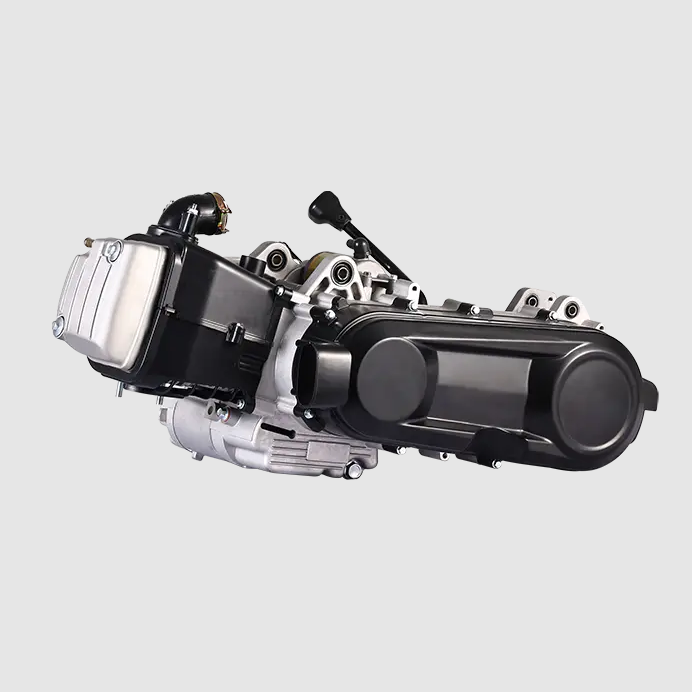Introduction to Air Filtration
Air intake is a critical component of any internal combustion engine. For scooters, the air filter ensures that the engine receives clean, particle-free air to mix with fuel for optimal combustion. In a Scooter Engine Manufacturer’s production environment, attention to proper filtration is vital because even small amounts of dust, dirt, or debris entering the cylinder can accelerate wear, reduce efficiency, and potentially cause long-term damage. While routine maintenance often focuses on oil changes and spark plugs, air filter condition plays an equally important role in preserving performance, fuel efficiency, and reliability.
How Clogged Filters Reduce Airflow
A clogged or dirty air filter restricts the volume of air entering the combustion chamber. This restriction reduces oxygen availability, which is essential for proper fuel combustion. Engines depend on a precise air-fuel ratio to generate maximum power. When airflow is restricted, the mixture becomes richer than intended, meaning there is more fuel than air. A richer mixture reduces combustion efficiency, leading to incomplete burning, higher fuel consumption, and potentially increased exhaust emissions. Scooters with blocked filters often feel sluggish during acceleration, as insufficient oxygen limits the engine’s ability to generate torque effectively.
Effects on Fuel Efficiency
When a scooter operates with a blocked air filter, the fuel injection system or carburetor compensates for reduced airflow by injecting additional fuel to maintain combustion. This overcompensation results in a noticeable drop in fuel efficiency. For riders, this means more frequent refueling and higher operational costs. In urban environments with stop-and-go traffic, the performance penalties become even more significant, as the engine struggles to maintain smooth acceleration. A well-maintained air filter ensures consistent fuel economy and predictable engine behavior, which is why a Scooter Engine Manufacturer emphasizes proper filter maintenance in user manuals and service recommendations.
Impact on Engine Power and Acceleration
Reduced airflow directly limits engine power output. When the engine cannot draw sufficient oxygen, combustion pressure decreases, lowering cylinder pressure and reducing torque. This is particularly noticeable during high-demand situations such as climbing inclines, rapid acceleration, or carrying heavy loads. Riders may experience slower response times, weaker acceleration, and a less smooth throttle feel. Over time, consistent operation under these conditions can strain the engine, potentially shortening component lifespan. For manufacturers, understanding the impact of air restriction helps in designing scooters that maintain performance even when filters begin to accumulate debris.
Potential Long-Term Damage
Beyond immediate performance losses, operating with a clogged air filter can increase internal engine wear. Restricted airflow can cause incomplete combustion, leaving carbon deposits on pistons, valves, and spark plugs. These deposits reduce efficiency further and can lead to misfires or engine knocking. Over months of neglected maintenance, accumulated debris in the air intake can also scratch cylinder walls, wear down piston rings, and damage bearings. A Scooter Engine Manufacturer designs engines to be durable, but clogged filters accelerate degradation that proper filtration maintenance could prevent.
Maintenance Recommendations
Regular inspection and cleaning or replacement of air filters is the most effective way to prevent performance losses. Most scooters have easy-access filter compartments designed for quick maintenance. Foam, paper, or fabric filters should be checked after exposure to dusty or polluted environments. For optimal performance, replacement intervals should follow the manufacturer’s guidelines, taking into account riding conditions. Some modern scooters feature air intake sensors that can alert riders to abnormal restrictions, further assisting in proactive maintenance.
Conclusion
Air filter condition is a crucial factor in scooter engine performance, fuel efficiency, and long-term durability. A blocked filter reduces airflow, weakens combustion, lowers acceleration, and increases fuel consumption. By maintaining clean air filters, riders ensure that engines operate efficiently and reliably, while manufacturers can achieve consistent performance standards. Attention to filtration is a simple but essential step that every Scooter Engine Manufacturer emphasizes to maximize the lifespan and responsiveness of their engines.
Nominal displacement:50ml
Displacement:49.4ml
Bore:39mm
Stroke:41.4mm
Compression ratio:10.5:1
Maximum power:2.7kw/7000r/min
Maximum torque:3.2N·m/5500r/min
Maximin fuel comsumption:≤367g/kW·h
Minimum stable idle speed:1700±100r/min
